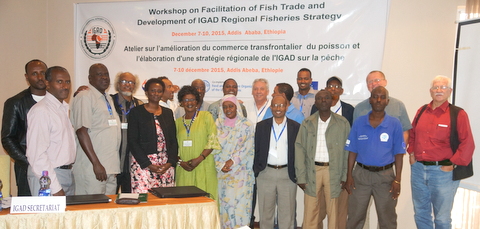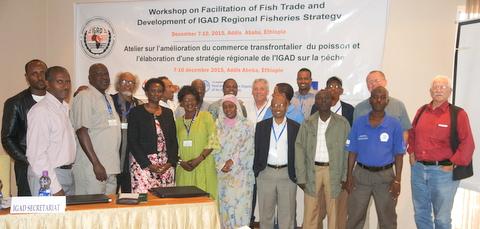
Addis Ababa 10th December, 2015: The Intergovernmental Authority on Development (IGAD) and regional fish experts from the IGAD Member States met between 9th and 10th of December 2015 in Addis Ababa, Ethiopia to share experiences, knowledge and agree on the fundamental steps to developing a much needed IGAD Regional Fisheries and Aquaculture Strategy.
Most of the current fishery activities in the IGAD region are focused on inland waters located in the highlands and populated areas. The fish resource potential and its contribution to resilience, food security and livelihood diversification in Arid and Semi-Arid Lands (ASALs) are often overlooked by Member States and development partners because the huge rivers with high potential for fisheries are mainly found in the lowlands most of which are trans-boundary rivers.
The two day intensive and enriching workshop shared challenges and recommendations that apply to all Member States such as;
Enhancement and Sustainability of Aquaculture
The experts strongly agreed on the importance of the introduction, adoption and development of aquaculture in the IGAD region in order to address the issues of food insecurity, increased population, climate change effects and other natural causes.
Aquaculture activities can act as an alternative means of income, increased fish (food) supply for subsistence and trade to address the issue of over-fishing that is currently taking place in inland lakes and rivers.
IGAD was urged to mobilize funds to develop aquaculture as well as facilitate information sharing between the Member States on existing case studies; their successes, challenges and opportunities that can benefit them. The Members were urged to be self-sustaining and set realistic production goals during the five year period.
Climate Change Effects
The team noted that actual and potential impacts of climatic change are large and wide ranging, affecting many aspects of people’s everyday lives as well aquatic life, floods and droughts becoming more common, coral bleaching, loss of breading grounds and dead mangroves leading to the migration of fish to more cooler areas leading to reduced fish catch figures hence affecting livelihoods and national income.
Awareness campaigns on climate change to fishing communities and resource managers through existing communication channels such as radio, mobile telecommunications, community and social meeting places can be an avenue through which people can be informed and called to action.
Illegal, Unreported and Unregulated Fishing (IUU)
Illegal fishing is taking place in the IGAD Region where fishers and vessels are harvesting fish in violation of the laws of fisheries under the jurisdiction of coastal states or to high seas fisheries regulated by Regional Fisheries Management Organisations (RFMO).
Just like the rest of the world, IGAD Member States are concerned and calling for a) strengthening of existing laws and policies with more stringent penalties for those involved in illegal fishing, b) providing economic incentives to encourage livelihood diversification and reduce dependence on climate-sensitive marine resources as well as access to credit, c) strengthening co-management and community-based management institutions, d) training and sensitization on effects of these practices, e) Stepping up on monitoring and surveillance practices despite the operational costs and challenges f) harmonised and uniform licencing fees and requirements g) Uniform collaboration on penalties across borders, h) capacity building of the fisheries sector i) sustainable extension programmes.
Government Priorities and Budget Allocation to Agriculture
In all IGAD countries there is minimal support for the Ministries of Agriculture and Fisheries Departments that are over ridden by other priorities like security, health, education and only a small fraction is given to the sector despite the important role they play in the national GDP and general social and economic development.
The team called upon the governments of the IGAD Member States as advocated under The Comprehensive Africa Agriculture Development Programme (CAADP) to have significant and continuous 10% budget allocations as well as concrete and appropriate policies, programmes and strategies coupled with strong political commitment and leadership.
It cannot therefore be ignored that fisheries performance is key, to growth and poverty reduction through its direct impact on job creation and increasing opportunities, especially for women and for the youth; on food security and improved nutrition; and on building resilience.
Market Access and Unattractive Investment Environment
Many of the fishing activities are on small scale and for subsistence use only with limited or no market information on fish value and marketable fish species that can be marketed and sold to other neighboring states or exported despite their lack of cold storage facilities.
Through training of trainers, usage of existing technology like mobile phones to inform and link buyers to fishermen will not only lead to improved livelihoods but increased knowledge in the field of operation hence more respect for the fisheries and aquaculture sector.
IGAD Member States agreed that there is need to open ‘doors’ to investors especially in aquaculture and fish production at the same time conforming to the world standards and requirements on safety and sanitation. Highly demanded species can also be introduced without an interruption in the ecosystem.
Poor Research and Data Collection
Planning against non-existing data is a universal challenge when looking into the underdevelopment and development of the fisheries sector in Africa.
Through improved reporting standards and access to fisheries catch data will help facilitate assessment of the impacts of climate change on fisheries and undertake ecosystem-based monitoring of aquatic, marine ecosystems and fisheries under the major current uses, including full fisheries closures, gear-managed and open access management systems this can be improved hence giving accurate numbers for better planning at national, regional and international levels.
Conservation of Ecosystems
The experts agreed that there is need to conserve the environment and through the identification of areas that require shore protection such as dykes, bulkheads, beach nourishment should be left to adapt naturally and should also encourage coastal and watershed basin management approach linking land-use practices to marine and fisheries resource conservation can help achieve this.
Establishment of networks of marine protected regions, small enclosures of fish species resilient to climate change impacts can also serve as buffer zones; areas for seed regeneration will also help conserve the ecosystem.
The experts agreed to research and consult before the introduction of exotic species and deal with diseases and chemical pollution and other external factors that may affect the ecosystem in the long term affecting the human and aqua life.
Women and Youth
It was noted that women in most Member States are only engaged at processing and marketing levels hence playing a major role in the end product. They require training in sanitation, book-keeping, storage, nutrition (fish nutritional values) and marketing. The women can also contribute towards a cultural change and having fish as a food alternative to red meat considering its benefits to growth and good health.
The youth to a large extent are not interested in fishing and there is a fear that the old generation will perish with the culture of fishing. Like the women, the youth need training and given career guidance in fishing, aquaculture, modern fishing methods and practices and trade.
Regional Fisheries and Aquaculture Strategy the way to go
The strategy that will be IGAD region specific still in its infant stage and once finalized and endorsed will be able to address, review and guide the fish component in the Arid and Semi-Arid Lands (ASALs) working as a building block to develop the fisheries and aquaculture sectors for the next five years (2016-2020).
IGAD has a mandate to contribute towards food security as well as economic development and regional integration among its Member States hence has the responsibility and role to check, improve, advise, recommend ways in which their social and economic development can be enhanced by working in harmony and collaboration with the Member States at all levels, private sector, governments, policy makers and development partners by sharing best practices, tools and manuals that can be applied and benefit the individual Member States.

